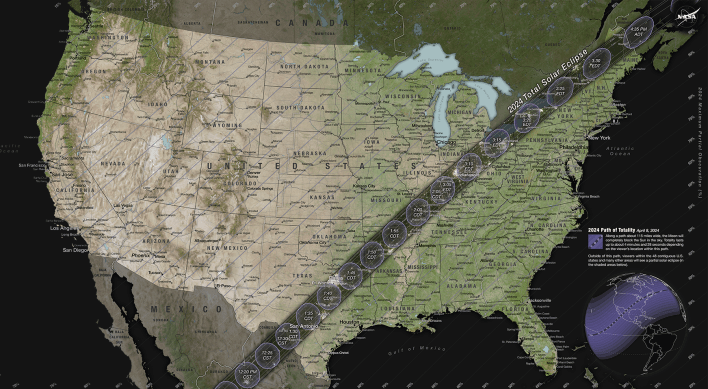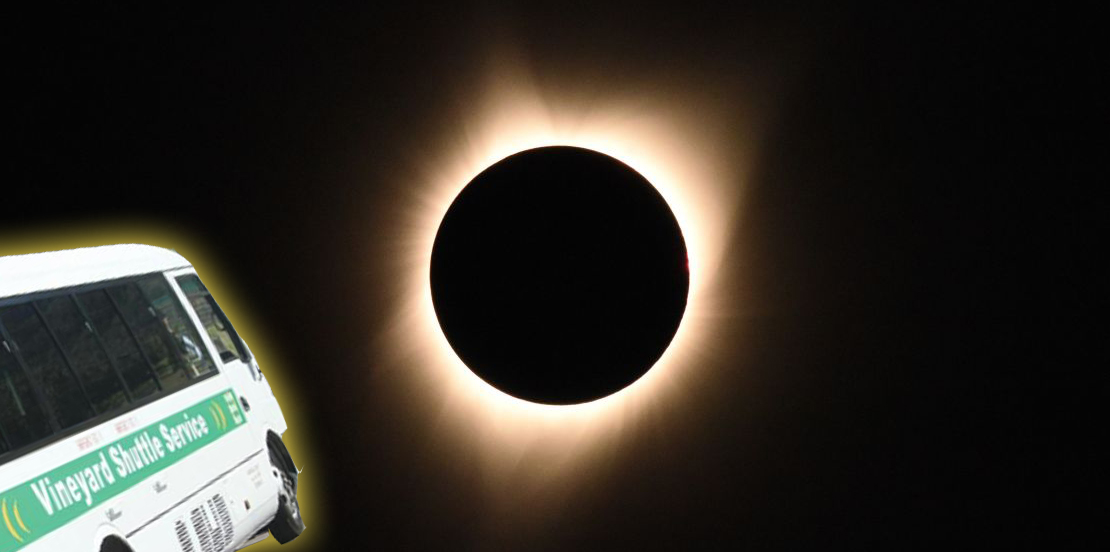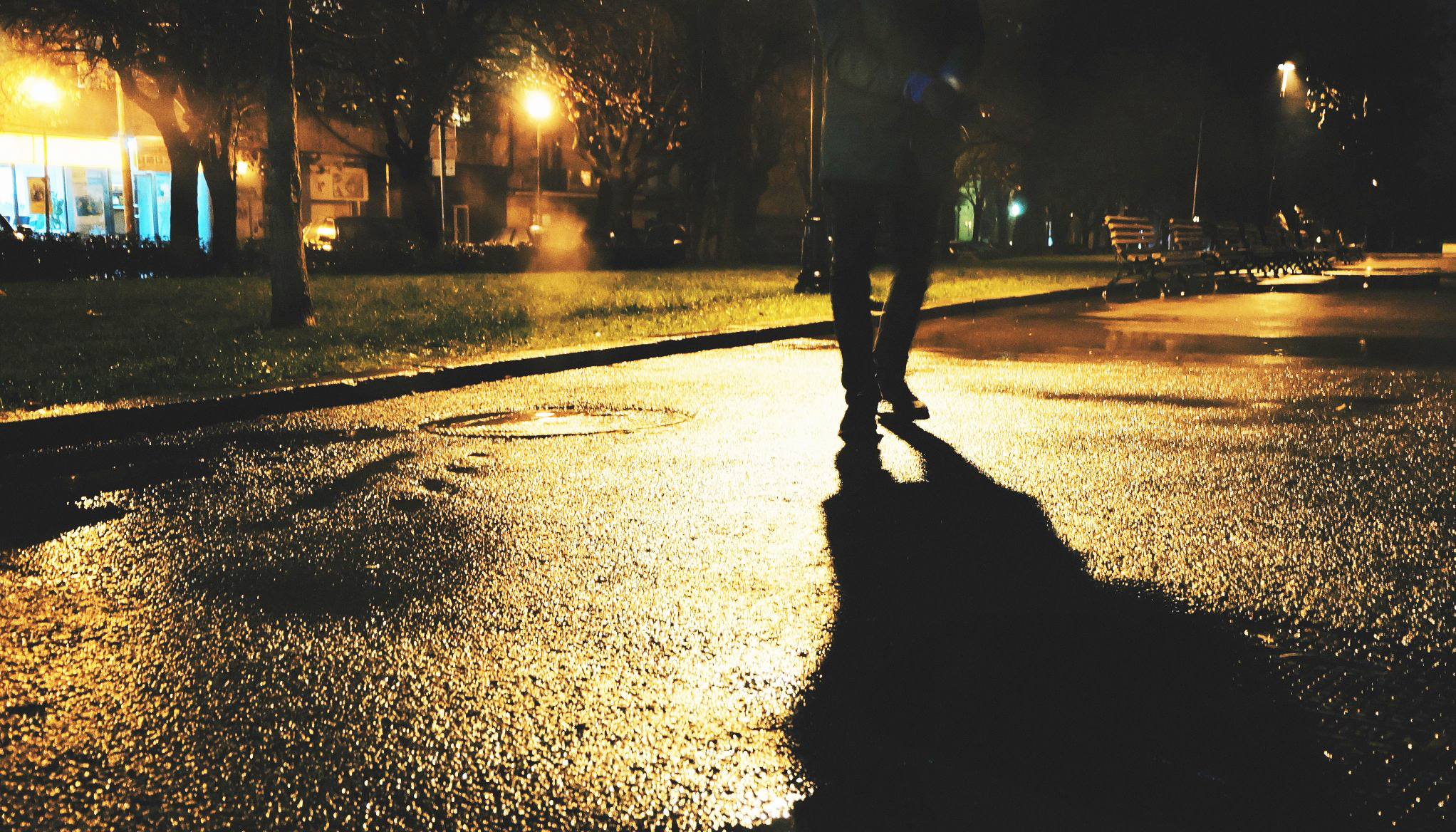There's a darkness on the edge of town.
The upcoming solar eclipse — one of the most anticipated events of the year — will cast a narrow band of the country in shadows, but it will also shed light on the fact that many areas can't deal with crowds of people because they have allowed car dependency to totally eclipse transit.
On Monday, April 8, the moon will pass between the Earth and the Sun, temporarily creating several minutes of eerie twilight along a 4,000-mile long and 115-mile wide swath of North America known as the path of totality.
More than 30 million people live within this path and tens of millions more are expected to travel to witness the celestial circumstance. Hotels there have been sold out for months, and seats on planes, trains, and buses to those regions are scarce. Officials are expecting traffic snarls in communities from Texas to Maine with crowds forming the equivalent of 20 to 30 Super Bowls occurring at once.
But some localities have not been steering tourists to use their transit systems. Instead they are warning drivers to gas up and prepare themselves for hours-long traffic delays. And small towns that don’t have sufficient transit even in normal times are begging visitors to stay longer to avoid nightmarish highway backups once the planetary party is over.
It doesn’t have to be a travel apocalypse. Some regions that are expecting their populations to double over the weekend are pre-emptively adding shuttle buses to move people efficiently to viewing destinations. Others are closing roads to cars to allow large crowds to gather and watch.
The astronomical interest in the eclipse represents an opportunity for public officials and transit leaders to strengthen their regional bus and rail systems which continue to face a “fiscal cliff” after the COVID-19 pandemic reduced ridership and federal subsidies for transit have begun to run out.
“Some communities are prepared, but this could be a learning experience to think not only about their residents moving around an area but also visitors,” said Benito Perez, policy director at Transportation for America. “If they want to invite and welcome visitors, this is a good lesson about where the transportation system is working and where it is not working. Customers want choices and if they don’t have choices, they won’t come.”
Shuttle-Friendly Cities
The arrival of the eclipse is allowing several cities to celebrate a rare moment of collective joy while also showing off their walkable downtowns.
Rochester, New York, has been planning an array of eclipse-related events for seven years, and is expecting nearly half a million visitors to the region thanks to marketing itself as the urban location within the path of totality that's closest to New York City, Boston and Philadelphia.

Most of those revelers are expected to swarm the city’s downtown area where the Rochester Museum & Science Center and several other museums are located. So the museum teamed up with the city’s convention bureau and First Student, a charter bus service create a free shuttle loop for three days of festivities.
“We have five cultural organizations hosting big events within a mile and a half so it’s a unique opportunity to capitalize on the proximity of the institutions. We want to connect folks,” said Rachel Laber Pulvino, Visit Rochester spokesperson. “Rochester can be a very car-dependent city. What’s equivalent to a 10-block walk in New York City, Rochester might say, ‘Oh my God that’s far.’ It’s not embedded in the culture.”
Rochester’s buses will run on a normal schedule on Monday, but officials at its Regional Transit Service are suspending two commuter routes into the city citing traffic forecasts of delays of two to five hours. Pulvino said most of the local buses make stops in and around the neighborhood where events will occur and Rochester’s main bus station is a short walk from a shuttle stop.
Meanwhile in Buffalo, officials expect one million people to visit sites across Erie and Niagara counties including the Bills home at Highmark Stadium in Orchard Park and Niagara Falls. The Niagara Frontier Transportation Authority, which serves both counties, is encouraging people to take transit to see major attractions and will have its buses running normally although bus drivers will pull over and stop when the total eclipse occurs. Discover Niagara is also operating its free shuttle service two months before its season officially starts to accommodate visitors who want to see the eclipse from Niagara Falls State Park.
"You don't want to be stuck in your car in traffic. You can come on there with people and if there are not a lot of cars on the road, if everybody's taking public transportation we can make it a much smoother ride," Kelly Khatib, NFTA's Public Information Officer, told WGRZ.
And in Cleveland, which is expecting 140,000 visitors over the weekend, the Greater Cleveland Regional Transit Authority is adding extra capacity to its bus and rail lines. Its Waterfront Line, which will run all weekend and from 9:30 a.m. to 5:27 p.m. on Monday, will be particularly crowded since it stops in front of the Great Lakes Science Center and Rock and Roll Hall of Fame, where tens of thousands of people will congregate.
“We just had St. Patrick's Day, which had a large crowd but we know this will be as big if not more,” said Robert Fleig, a public information officer at GCRTA. “A lot of organizations are encouraging people who come downtown to take RTA, because of the crowds and traffic jams that will exist. If you take the train you can get dropped off right there and not have to worry about parking.”
Several smaller municipalities are also launching temporary shuttle services for the event. The Erie Metropolitan Transportation Authority is running an eclipse bus on a 15-block loop in downtown Erie. Poplar Bluff, Missouri and the Southeast Missouri Transportation Service are running free buses between hotels and restaurants as 20,000 people are expected to descend on the region. Four hours away at Arkansas’s Hot Springs National Park, one of two national parks in the path of totality, officials are running free shuttles every 20 to 30 minutes.
In Upstate New York, Clinton County Public Transit will operate two buses along a route between Plattsburgh International Airport and three sites in Plattsburgh, NY. And across Lake Champlain, where the 40,000-population of Burlington is expected to double, officials are working with the Vermont Transit Association to close Route 127 to car traffic and run shuttle buses along a 1.1-mile route to Burlington Union Station on the lakefront.
“There was a lot of dismissiveness toward it at first, but we’re glad we started planning it when we did,”said John Flanagan, communications director at Burlington City Arts. “We feel we’re in pretty good shape to welcome everybody.”
Traffic Carmageddon
Those content to drive to their eclipse watch spots could spend much of the weekend idling on freeways.
With traffic expected to back up for several hours on interstates starting this weekend, state department of transportation officials are warning drivers to fill up their gas tanks and pack water so they don’t get stranded.
Texas roads could be particularly clogged. One million visitors from other parts of the state and beyond are expected to cluster within the path of totality which will cross Uvalde, Dallas, Waco, Tyler, and much of metropolitan Austin and San Antonio.
Texas DOT officials will have extra crews on the roads and are setting up highway signs warning people not to park on the shoulder or stop on the highway to view the eclipse.
“The biggest thing is be prepared as much as you can for heavy traffic and plan for an increase in travel time, and know where you’re going and where you’re going to park,” said Adam Hammons, a TxDOT spokesman. “Treat it like you’re going on a long road trip. Get snacks, water, fill up your tires. In some areas, we’re expecting rush hour traffic times four.”
Dallas officials are encouraging residents to ride DART rail lines to eclipse watch parties at the AT&T Discovery District, Klyde Warren Park, the Perot Museum of Nature and Science, and Reunion Tower.
Austin and San Antonio are running normal transit service on Monday, too, but since the path of totality is occurring on the northwest edge of both cities, many Texans are planning to travel to state parks in Hill Country suburbs such as Kerrsville and Fredericksburg. Public transit to those areas is significantly more limited, which could lead to delays on nearby highways.
“Our hotels are booked up and we’re expecting a lot of people to use Austin as a launching pad,” said Lee Nichols, a spokesperson at the Austin Transportation and Public Works Department. “Out in Hill Country, they don’t have the kind of hotel capacity for this. It will overwhelm the small towns.”
Perez, from Transportation for America, hopes the eclipse will lead to a shift towards more frequent transit service to larger swaths of metropolitan areas.
“This should be something talked about more regularly as to why it’s not an option,” he said. “If there is a transit option it might be once a day and if you miss it then you’re out of luck. It speaks to the cultural mindset that these options aren’t viable.






